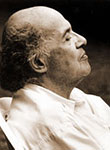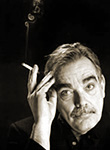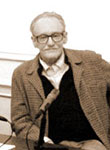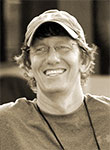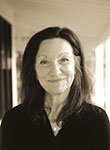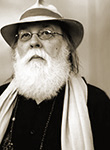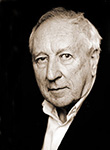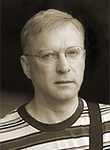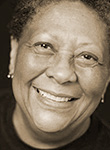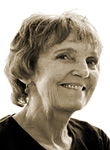Recommendations, Community, and Remembrance
Mary Flinn, Blackbird Founding Editor
Welcome to Blackbird’s In Previous Issues. Here we call your attention to work in our archives that for one reason or another has particular resonance against the work being newly published and/or the moment in which we are publishing. In addition, we will recognize work by old friends who are also current contributors and significant book-length material that we believe deserves steady and ongoing attention.
Again, sadly, we mark the passing of two former contributors, Gerald Stern and Peter Schjeldahl, both of whom were kind enough to lend us their presence in Blackbird’s early days as we were trying to establish our voice and reputation.
Gerald Stern came to us in part through his connection to Larry Levis, whose friend he had been, and he visited Virginia Commonwealth University to work with Levis’ students several times in the year after Levis’ death. Stern first appeared in Blackbird v2n2 with three poems, and in v8n2, Blackbird published Stern’s recreation of the Book of Isaiah in his long poem “I.” His poem “Larry Levis Visits Easton, PA During a November Freeze” and a reading appeared in v7n2. Like much of Stern’s work this poem invokes the easy intimacy of friendship tied to specificities that site the poem very directly in time and place.
I said “Dear Larry” as I put down his book, Elegy,
across the street from the Home Energy Centerand its two embellished secular Christmas trees
and its two red wreathes over red ribbon crosses
As Gregory Donovan notes in his remembrance of Stern:
Gerald Stern wrote as he lived, with the open-hearted generosity and caring of a Walt Whitman, with the brilliance and humor of a troublemaker like Lenny Bruce, and with the sharp eye, bold courage, and rebellious spirit of a union organizer.
Blackbird interviewed Peter Schjeldahl for v3n1 when he visited Richmond in 2004 as the juror for an exhibition of Mid-Atlantic artists at 1708 gallery. Characteristically, Schjeldahl discussed art with generosity and appreciation. When asked if there were hope for art in increasingly bloody and confusing 21st century, he stated:
Franz Kafka once said there is infinite hope, but not for us. I guess that would depend on whether you include yourself in that us or not. There’s infinite hope. People get up in the morning and make art, look at art, think about art, and sell it. No, the art world isn’t broken.
In v15n2 Blackbird published Adam Latham’s story “The Lizard Man,” which later won the Rebecca Mitchell Tarumoto Short Fiction Prize. In 2018, Latham visited Richmond for a reading from his story, and audio of the reading was published in 17n2. The story is the generative impetus for Latham’s novel in progress dealing with various reported cryptids and which Latham has traveled widely to investigate. An update on his research appears here in Nonfiction.
T.R. Hummer first appeared in Blackbird in v2n2 with the essay “Tutelary Instruments,” the multipart poem “For Dancers Only: Suite for Jimmie Lunceford, 1902–1947” (with musical epigraphs), and an interview. His poems also appeared in v11n2 and v15n1. The audio of a reading was published in v14n1, and his masterful essay exploring the intersection of jazz and poetry in the work of Philip Levine, “Body Swayed to Music: Levine Among the Musicians,” appeared in v17n2. We remain grateful for his support and for his continued attention to how we live in this world. Three new poems appear in this issue, and in “Notes in the Margin,” Hummer tells us:
Behind them
under the canopy sprawl understory plants
Whose names I don’t know. I won’t look them up
In the field guide. For once the names don’t count.
It doesn’t matter how many sentences I read.
I’ve let the pages pile up over so many decades
It’s impossible to remember what I was before.
C. Dale Young has been represented in Blackbird by a poem in V3n1, a story in v20n1, and as a participant in a group reading in v12n2. Three new poems appear in this issue. In v16n1, his poem “Las Palmas Reales” asks that we know:
It has always been this way.
The tourists are captivated by a boy
who chops the head of a coconut clean off
and drinks the water hidden within its dark
and solid husk. Amazing, they say. But this,
this is as common as salt, as common as rain
Jill McCorkle’s story from v6n2, “Going Away Shoes,” opens by introducing us to a character who seems preserved in an amber created by abandoned dreams:
Debby Tyson is a mythical stereotype, the oldest child who stays home to tend the sick and dying mother while her sisters marry and have prosperous lives elsewhere. They pity her, she can tell. They tell her stories of late blooming love and how they want to send her on a cruise, something batted around every year before the holidays but yet to materialize.“It could happen, Debby,” they say. “Remember The Love Boat?”
In audio from v16n1, McCorkle joined other writers gathered to remember Claudia Emerson at AWP in the spring of 2017, and a new story, “Confessional,” is included in this issue.
Artist and printmaker David Freed’s work has been featured in Blackbird through his collaboration with Charles Wright in v13n2, in an initial presentation of his portraits of Larry Levis in v2n2, and by recent mixed media drawings in v18n1. v21n2 revisits his work on or about Levis.
Blackbird has an extensive archive of work linked to Larry Levis, but for this issue, we call your attention to “Two Trees,” from v3n2 and to “Elegy with a Thimbleful of Water in a Cage,” from v2n2. Both poems connect to work by David Freed.
Poems by Robert Wood Lynn, Sara Eliza Johnson, and Bruce Bond were published in v19n1, v17n2, and v21n1, respectively, and mini-reviews of their work by Danielle Kotrla, Rebecca Poynor, and Waverley Vesely can be found in this issue.
~
Serial Publications in Blackbird
Blackbird has published two full-length books in our pages and is in this issue completes the process of publishing two more.
Early on, Blackbird presented the entirety of Norman Dubie’s “The Spirit Tablets at Goa Lake,” a book-length futurist poem. The poem was issued serially in three parts, beginning with the “Book of the Jewel Worm” in v1n2. It was followed by the other two sections, “Book of the Jaspers” and “The Book of Crying Kanglings,” in v2n1 and v2n2, as well as a helpful introduction and glossary. As Dubie states in a note to the piece,
This futurist poem enjoys the broken narration of its hero, Paul Ekajati, an amateur mathematician who once taught the Calculus on our moon. He is now an exhausted buddhist Vajramaster living in a small village at the Bakavi Lake Mining Colony on Mars. The year is 2277. Yeshe Khandro is in her last black ovum. Or, I should say that a raised mischievous voice in the poem belongs to a dakini “wisdom traveler in space” and that she is the destroyer of the Vega Remnant, LXT. There are eleven spirit tablets.
Nobel Prize-winning author Tomas Tranströmer’s 1996 book Sorgegond olen (Sorrow Gondola), in a new translation by Patty Crane and accompanied by the original Swedish, was published in Blackbird v10n1. To accompany the new translation Jean Valentine provided a letter to the Nobel laureate and David Wojahn presented a compelling meditation on literary friendship and correspondence in “Unlikely Magic, (on Airmail: The Letters of Robert Bly and Tomas Tranströmer).” There, Wojahn states, “The great subject of the poetry of Tomas Tranströmer—sometimes it seems as though it is his only subject—is liminality. He is a poet almost helplessly drawn to enter and inhabit those in-between states that form the borderlines between waking and sleeping, the conscious and the unconscious, ecstasy and terror, the public self and the interior self. Again and again his poems allude to border checkpoints, boundaries, crossroads: they teeter upon thresholds of every sort—be they the brink of sleep or the brink of death, a door about to open or a door about to close.” In v19n1, Blackbird published six new Crane translations of Tranströmer poems.
Since Wesley Gibson’s death in December 2016, Blackbird has contemplated ways to ensure his literary voice maintains a presence in the world. With that end in mind, we are in the process of reproducing his book, You Are Here: A Memoir of Arrival, which was published in 2004 by Back Bay Books. The book, in part, is an account of Gibson’s witness to the HIV/AIDS crisis and its effects in New York City. Hailed at the time by Mary Gaitskill as “dark and sparkling, wonderfully intelligent, flip, and deeply felt,” You Are Here affords an excellent vehicle for honoring Gibson’s many strengths as a writer and his generosity of spirit as a friend. The first installment appeared in v17n1, and the text continues through v18n1, v18n2, v19n1, v19n2, v20n1, and v20n2, and v21n1. The final installment appears in this issue. A review of You Are Here and a reading by Gibson were published in v3n1. His story, “The Raccoon,” appeared in v10n2.
Marilyn Nelson has for many years celebrated her friendship with Danish writer Inge Pedersen by translating her work, thus making it more available to the Anglophone world. Nelson’s translations of poems from Pedersen’s Den trettende måned appeared in Blackbird v1n1. Her translation of “Clouds and Fire Engines,” an excerpt from Pedersen’s last novel, The Path Leads through the Air, appeared in v18n1, followed by “The Apple” in v18n2, “Seedings” in v19n1, “Mail” in v19n2, “That’s How It Goes Here” in v20n1, “Putting a Letter in the Mailbox” in v20n2, and “I Said Nothing” in v21n1. The final installment, “Breathing Technique,” appears here. Nelson herself is the author and translator of more than twenty books of poetry for both children and adults. ![]()
Contributor photos link to an index of previous work in Blackbird.
